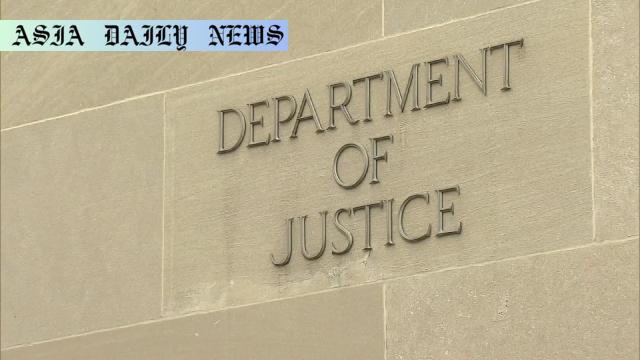Espionage: Former Fed senior adviser John Rogers arrested for conspiring to steal trade secrets for China, DOJ reveals.
Former Fed adviser John Rogers arrested for espionage tied to China.
DOJ indicts Rogers for trading Federal Reserve secrets with China.
He allegedly shared economic insights with Chinese intelligence operatives since 2018.
Espionage act includes covert meetings and email exchanges of confidential Fed data.

Introduction: Espionage Unveiled
In a shocking development, the U.S. Department of Justice (DOJ) has announced that John Rogers, a former senior adviser in the Federal Reserve’s international finance division, has been arrested and indicted on espionage charges. This case highlights the alarming reality of economic espionage targeting the United States, particularly by foreign adversaries like China. Rogers is alleged to have shared highly confidential information with individuals tied to China’s intelligence and security agencies from at least 2018 to 2021. His actions, if proven true, represent a grave threat to U.S. financial stability and national security.
The Allegations Against John Rogers
The 63-year-old Rogers, employed by the Federal Reserve from 2010 to 2021, is accused of repeatedly breaching Federal Reserve protocol to leak sensitive trade secrets and economic data. Prosecutors allege that Rogers utilized email and printouts to transfer confidential information to his personal account, which he carried with him during trips to China. These trips were disguised as academic endeavors where he claimed to teach classes but secretly met Chinese operatives in hotel rooms to share the classified materials. The sensitive information reportedly included deliberations of the Federal Open Market Committee (FOMC) and forthcoming announcements that could influence global markets.
China’s Espionage Agenda
The accusations against Rogers align with a broader trend of economic espionage activities allegedly orchestrated by the Chinese Communist Party (CCP). According to the Federal Bureau of Investigation (FBI), China’s intelligence apparatus has expanded its efforts to undermine the United States, targeting government bodies and corporate entities to gain financial and strategic advantages. The FBI emphasized that these activities aim to disrupt U.S. financial policies and position China as the world’s dominant superpower. Cases like Rogers’ underscore the importance of safeguarding sensitive data and developing robust counterintelligence measures.
A High-Stakes Threat to Financial Systems
The specifics of the stolen information make this case uniquely alarming. The Federal Reserve plays a critical role in the U.S. economy, and any breach of its confidential operations can have wide-reaching implications. The Federal Open Market Committee meetings, for example, contain discussions about interest rates, inflation targets, and economic forecasts. Unauthorized leaks of this nature could disrupt global markets, encourage speculative activities, or undermine policy decisions vital for economic stability. Such espionage raises questions about the adequacy of current cybersecurity and insider threat mitigation strategies within highly sensitive governmental organizations.
How the Authorities Are Responding
The DOJ has made it clear that economic espionage will not be tolerated, pledging to leverage every tool available to prosecute individuals who compromise national security. Their statement emphasized the importance of protecting U.S. trade secrets and ensuring justice is served. The FBI echoed this sentiment, stating that they remain vigilant in identifying and dismantling spy networks operating within U.S. borders. This case serves as a reminder for organizations, both public and private, to enhance internal security protocols, including background checks, data encryption, and awareness programs to identify and deter insider threats.
The Bigger Picture
John Rogers’ story symbolizes a significant issue facing modern governments: the vulnerability of public institutions to foreign interference. Global superpowers like China have ramped up their espionage capabilities, exposing the inadequacy of existing safeguards in protecting sensitive assets like financial data and trade secrets. With advancements in technology and the evolving nature of international relations, it is imperative for the United States to upgrade its counterintelligence operations. As nations navigate this perilous terrain, the fight against espionage will require strategic partnerships, vigilance, and innovation on multiple fronts.
While Rogers awaits trial, his case serves as a stark warning of the need for vigilance in protecting U.S. interests against foreign espionage. It calls for a proactive approach to ensuring that incidents like these are prevented before they can harm the nation’s economy or security.
Commentary
The Growing Threat of Economic Espionage
The arrest of John Rogers sheds light on a grave and growing threat: economic espionage. This case serves as a wake-up call for both policymakers and citizens regarding the vulnerabilities of our nation’s critical institutions. As global tensions rise and technological advancements create new opportunities for subversion, it’s clear that foreign governments are leveraging every tool to gain an upper hand. The role of insiders like Rogers, who intentionally breach trust, amplifies the risks and challenges facing intelligence and security agencies tasked with safeguarding national interests.
Lessons in Vigilance
While the specifics of this case are shocking, they are not altogether surprising. Espionage is as old as diplomacy itself, yet the stakes have never been higher. The Federal Reserve represents not just financial stability for the U.S., but a pillar of trust for the global economy. When institutions like this are targeted, the ripple effects can be immense, affecting markets, policies, and livelihoods in profound ways. This underscores the need for vigilance, both within governmental organizations and private enterprises that handle sensitive information.
What We Can Learn Moving Forward
Addressing the root causes and enabling stronger preventive measures is crucial in ensuring such incidents don’t recur. Robust vetting processes, stringent cybersecurity measures, and regular internal audits need to become routine practices in organizations where sensitive information is stored or discussed. Additionally, public awareness campaigns on the dangers of espionage could help cultivate a culture of accountability and vigilance. The fight against economic espionage is not just the responsibility of intelligence agencies but of all stakeholders dedicated to securing our shared future.


